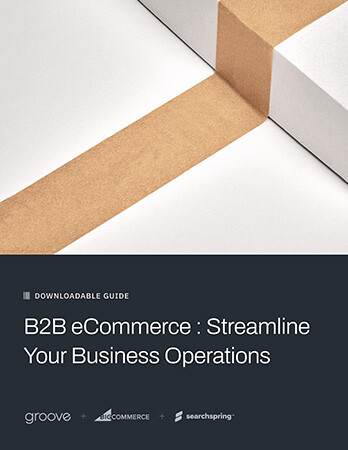Business-to-business electronic commerce—or B2B eCommerce—refers to digital transactions of goods and services between two companies. This differs from B2C eCommerce, which refers to transactions between businesses and individuals. While B2B eCommerce involves commercial exchanges, B2C consists of retail sales.
As the world continues to become increasingly digital, businesses have to work hard to keep up. The rising demand for online systems to manage inventory, sales, and customer relationships has pushed the growth of B2B eCommerce forward. An increasing number of companies are working in international markets and need straightforward B2B sales systems that make it easy to connect with people around the world. B2B eCommerce platforms simplify transactions between businesses, no matter where they’re located.
Reach out to Groove Commerce today to learn how we can support your B2B eCommerce needs.
What Is B2B eCommerce?
The B2B eCommerce model has many components, including bulk orders, negotiated pricing, and complex approval processes.
When you consider B2B eCommerce’s definition and what it means for your company, it’s helpful to know that major B2B industries include:
- Manufacturing: It’s common for manufacturers to sell raw materials to other businesses. For example, a flour mill might sell bulk sacks of flour to a commercial bakery.
- Wholesale: Bulk distributors—like soda companies—sell their products to individual grocery and convenience stores.
- Distribution: These businesses serve to connect end-users with products that they need. For example, an educational supply company might provide school districts with classroom furniture.

Key Features of B2B eCommerce Platforms
B2B eCommerce platforms are specially designed to meet the needs of companies that sell goods and services to fellow businesses.
B2B eCommerce features that can be seen across a variety of B2B platforms include:
- Complex pricing structures: B2B transactions are often more complicated than B2C sales. Discounts and price changes may apply based on contract terms, volume, or loyalty, and payment terms might be extended to suit the needs of the purchasing company. B2B eCommerce platforms offer ways to manage complex pricing structures, streamlining the ordering process.
- Advanced order management: Typically, B2B purchases occur on a larger scale than B2C transactions. Goods and services may be delivered on a schedule to accommodate these needs, and a business should be able to manage automatically scheduled goods and services through its B2B eCommerce platform.
- Personalized customer portals: From customized pricing structures to scheduled deliveries and integrated Enterprise Resource Planning (ERP) systems, B2B eCommerce platforms frequently offer personalized customer portals to meet the needs of purchasing organizations.
Differences Between B2B and B2C eCommerce
It’s also important to know how B2B differs from the alternatives if you ask, “What is B2B eCommerce?” There are several differences when you compare B2B vs. B2C eCommerce, such as:
- Longer sales cycles: Negotiation, contract terms, and research can all contribute to a longer sales cycle in B2B eCommerce.
- Larger transactions: From bulk orders to subscription models, B2B companies often sell high-value products and services, resulting in bigger transactions.
- More stakeholders: Complex decision-making processes typically require input from multiple executives, finance departments, and others within a company.
- Customer journeys: In a B2B eCommerce environment, buyers evaluate several vendors, move through discussions and negotiations, and work with the seller throughout the use of the product or service. In a B2C customer journey, the buyer typically makes a quick decision that requires little to no engagement on the part of the seller.
- SEO approaches: B2B SEO strategy requires long-tail keyword research utilizing technical terms, in-depth content (such as white papers and case studies), and targeted landing pages. On the other hand, B2C SEO involves customer-oriented keyword research, vibrant and engaging content, and compelling descriptions on landing pages.
Reach out to Groove Commerce today to learn how we can support your BigCommerce business. For specific examples of our success in serving B2B sellers, see our case studies.
Benefits of B2B eCommerce
B2B eCommerce platforms can help your business streamline operations while improving customer relationships and increasing sales. Automating the sales process can help your team focus on supporting customers and boosting efficiency. Your buyers will love the simple ordering process, and your team will love how easy it is to onboard new clients.

Reach out to Groove Commerce Today to Grow Your B2B Organization
In today’s world, using a B2B eCommerce platform is vital for B2B operations. At Groove, we’re here to help you adopt a new platform with the B2B eCommerce features that make sense for you. Reach out to our team today and request a free SEO audit to get started.

eBook
B2B eCommerce: The Complete Guide to Accelerate Growth
Explore tags:
About the author
Subscribe to the Groove Newsletter
Get the latest updates and insights straight to your inbox






